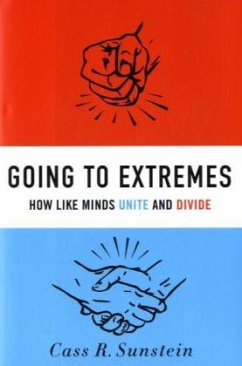Why do people become extremists? What makes people become so dismissive of opposing views? Why is political and cultural polarization so pervasive in America? Why do groups of teenagers, investors, and corporations take unnecessary risks? What leads groups to engage in such destructive acts as terrorism and ethic cleansing?
In Going to Extremes, renowned legal scholar and best-selling author Cass Sunstein offers startling insights into why and when people gravitate toward extremism. Sunstein marshals an abundance of evidence that shows that when like-minded people talk to one another, they tend to become more extreme in their views than they were before. This point applies to such diverse groups as religious organizations, corporate boards, investment clubs, and White House officials. Sunstein
introduces original research to show that when liberals are brought together to debate climate change, they end up more alarmed about climate change, while conservatives brought together to discuss same-sex unions become skeptical about same-sex unions. In courtrooms, radio stations, and chatrooms, enclaves of
like-minded people are breeding ground for extreme movements.
Sunstein shows that a good way to create an extremist group, or a cult of any kind, is to separate members from the rest of society, either physically or psychologically. This disturbing finding casts new light on the dangers that arise whenever people self-select into niche groups of the like-minded. Sunstein's findings help to explain such diverse phenomena as political outrage on the Internet, unanticipated "blockbusters" in the film and music industry, the success of the disability rights
movement, ethnic conflict in Iraq and former Yugoslavia, and Islamic terrorism.
Providing a wealth of real-world examples--sometimes entertaining, sometimes alarming-- Sunstein offers a fresh explanation of why partisanship has become so bitter and debate so rancorous in America and abroad--and of what concrete steps citizens and nations might take to halt the drift towards unjustified extremism.
In Going to Extremes, renowned legal scholar and best-selling author Cass Sunstein offers startling insights into why and when people gravitate toward extremism. Sunstein marshals an abundance of evidence that shows that when like-minded people talk to one another, they tend to become more extreme in their views than they were before. This point applies to such diverse groups as religious organizations, corporate boards, investment clubs, and White House officials. Sunstein
introduces original research to show that when liberals are brought together to debate climate change, they end up more alarmed about climate change, while conservatives brought together to discuss same-sex unions become skeptical about same-sex unions. In courtrooms, radio stations, and chatrooms, enclaves of
like-minded people are breeding ground for extreme movements.
Sunstein shows that a good way to create an extremist group, or a cult of any kind, is to separate members from the rest of society, either physically or psychologically. This disturbing finding casts new light on the dangers that arise whenever people self-select into niche groups of the like-minded. Sunstein's findings help to explain such diverse phenomena as political outrage on the Internet, unanticipated "blockbusters" in the film and music industry, the success of the disability rights
movement, ethnic conflict in Iraq and former Yugoslavia, and Islamic terrorism.
Providing a wealth of real-world examples--sometimes entertaining, sometimes alarming-- Sunstein offers a fresh explanation of why partisanship has become so bitter and debate so rancorous in America and abroad--and of what concrete steps citizens and nations might take to halt the drift towards unjustified extremism.

